Medium

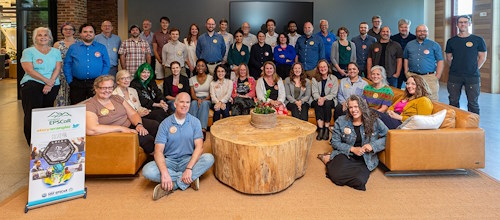
SOCKS All Hands Meeting
Monday, March 30, 2026 from 8:30 AM to 4:30 PM - Silver Maple Ballroom, UVM Davis Center
Vermont EPSCoR will holds its 2026 SOCKS All Hands Meeting on Monday, March 30th. Please join us for an update on our progress at the end of Year 3 and a look into the future.
Click here for more information!
Vermont EPSCoR will holds its 2026 SOCKS All Hands Meeting on Monday, March 30th. Please join us for an update on our progress at the end of Year 3 and a look into the future.
Click here for more information!
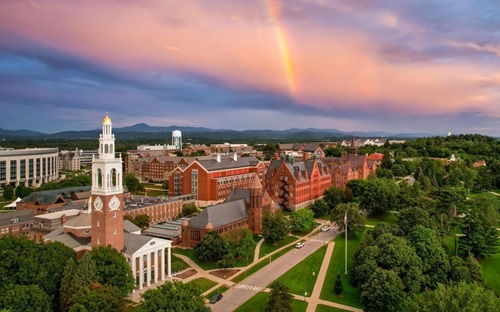
IC2S2 2026
Tuesday, July 28 through Friday, July 31, 2026 - University of Vermont
The International Conference for Computational Social Science (IC2S2) will be hosted by the Vermont Complex Systems Institute at the University of Vermont in Burlington, Vermont from July 28-31, 2026. IC2S2 has emerged as the dominant conference at the intersection of social and computational science, bringing together researchers from around the world in sociology, economics, political science, psychology, cognitive science, management, computer science, statistics and the full range of natural and applied sciences committed to understanding the social world through large-scale data and computation. IC2S2 is the annual conference of the International Society for Computational Social Science.
More Information
Register
The International Conference for Computational Social Science (IC2S2) will be hosted by the Vermont Complex Systems Institute at the University of Vermont in Burlington, Vermont from July 28-31, 2026. IC2S2 has emerged as the dominant conference at the intersection of social and computational science, bringing together researchers from around the world in sociology, economics, political science, psychology, cognitive science, management, computer science, statistics and the full range of natural and applied sciences committed to understanding the social world through large-scale data and computation. IC2S2 is the annual conference of the International Society for Computational Social Science.
More Information
Register


Alan Alda Communicating Science Workshop
Wednesday, January 7, 2026 from 9:00 AM to 12:00 PM
Vermont EPSCoR is happy to offer an online Alan Alda Communicating Science Workshop. The Alan Alda Communicating Science Workshop provides valuable training, strategies and tools to help participants communicate complex scientific concepts to a broad audience. All members of the SOCKS team are highly encouraged to take advantage of this opportunity.
Registration for this workshop has closed. We look forward to seeing everyone who has registered for this exciting online workshop!
Vermont EPSCoR is happy to offer an online Alan Alda Communicating Science Workshop. The Alan Alda Communicating Science Workshop provides valuable training, strategies and tools to help participants communicate complex scientific concepts to a broad audience. All members of the SOCKS team are highly encouraged to take advantage of this opportunity.
Registration for this workshop has closed. We look forward to seeing everyone who has registered for this exciting online workshop!
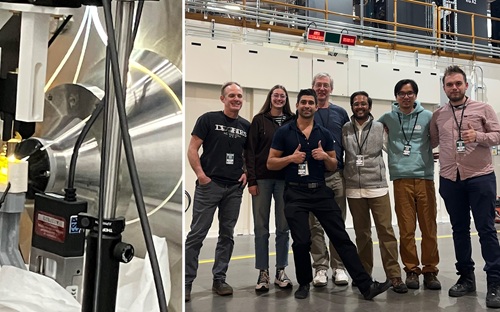
STTR/SBIR Phase(0) Webinar
December 5, 2025 from 2:00 to 3:00 PM
The purpose of the webinar is to review program requirements, recommend application strategies for success and address questions. Advance registration is not required.
This webinar will include a presentation by Dr. Bernard "Chip" Cole, VT EPSCoR State Director, and RII Track-1 SOCKS PI , on the Vermont EPSCoR Pilot and STTR/SBIR Phase(0) funding mechanisms. Dr. Cole will review program requirements, application strategies and address your questions.
Join Webinar on December 5th (Microsoft Teams link)
Photo credit: Brad Palmer, Sarcometrics
The purpose of the webinar is to review program requirements, recommend application strategies for success and address questions. Advance registration is not required.
This webinar will include a presentation by Dr. Bernard "Chip" Cole, VT EPSCoR State Director, and RII Track-1 SOCKS PI , on the Vermont EPSCoR Pilot and STTR/SBIR Phase(0) funding mechanisms. Dr. Cole will review program requirements, application strategies and address your questions.
Join Webinar on December 5th (Microsoft Teams link)
Photo credit: Brad Palmer, Sarcometrics
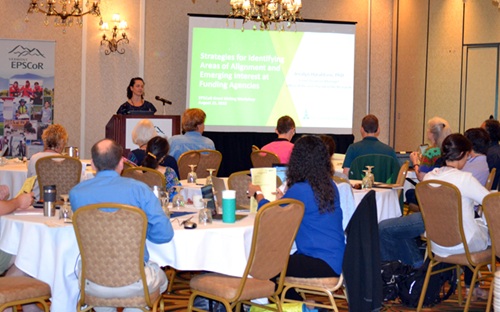
Grant Writing Workshop
Friday, November 7, 2025 from 12:00 to 5:00 PM
Roy Room, Dion Family Student Center, Saint Michael's College
Co-sponsored by Vermont EPSCoR and the Vermont Biomedical Research Network (VBRN), this workshop will provide attendees with opportunities for research networking and support on grant writing.
To register please RSVP to epscor@uvm.edu.
Roy Room, Dion Family Student Center, Saint Michael's College
Co-sponsored by Vermont EPSCoR and the Vermont Biomedical Research Network (VBRN), this workshop will provide attendees with opportunities for research networking and support on grant writing.
To register please RSVP to epscor@uvm.edu.
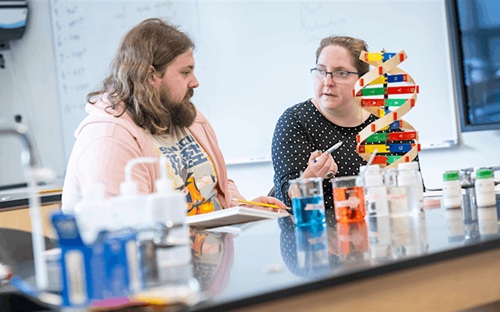
Free Webinar: Neurodiversity and STEM: Rethinking How All Minds Can Thrive
Tuesday, October 28, 2025 from 2:00 to 3:30 PM
Join the Science and Technology Research Initiative for the Vermont Economy (STRIVE) in a webinar exploring how inclusive practices can make STEM more accessible to all learners.
For more information about STaRS, click here.
Join the Science and Technology Research Initiative for the Vermont Economy (STRIVE) in a webinar exploring how inclusive practices can make STEM more accessible to all learners.
For more information about STaRS, click here.
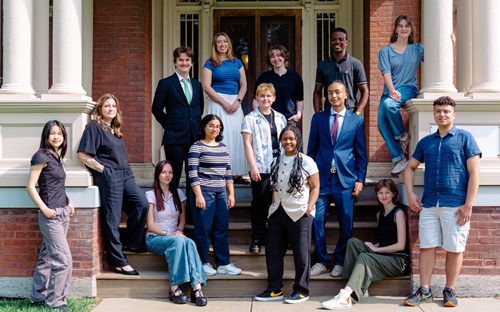
2025 SOCKS Summer Internship Symposium
Monday, July 28th, Wednesday, July 30th, Thursday, July 31st from 9:00 AM to 12:00 PM each day - Silver Maple Balrroom, UVM Davis Center
Join us as the SOCKS Summer Interns present their summer research projects. A Q&A session will follow the presentations.
Join us as the SOCKS Summer Interns present their summer research projects. A Q&A session will follow the presentations.
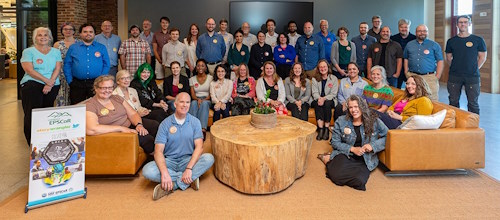
2025 Vermont EPSCoR All Hands Meeting
Monday, April 14, 2025 from 8:30 AM to 4:30 PM - UVM Alumni House (61 Summit Street, Burlington, VT)
Vermont EPSCoR will holds its 2025 SOCKS All Hands Meeting on Monday, April 14, 2025 from 8:30 AM to 3:30 PM at the UVM Alumni House (61 Summit Street, Burlington, VT). Please join us for an update on our progress at the end of Year 2 and a look into the future. More information will be available in early 2025. Please check back soon!
Vermont EPSCoR will holds its 2025 SOCKS All Hands Meeting on Monday, April 14, 2025 from 8:30 AM to 3:30 PM at the UVM Alumni House (61 Summit Street, Burlington, VT). Please join us for an update on our progress at the end of Year 2 and a look into the future. More information will be available in early 2025. Please check back soon!
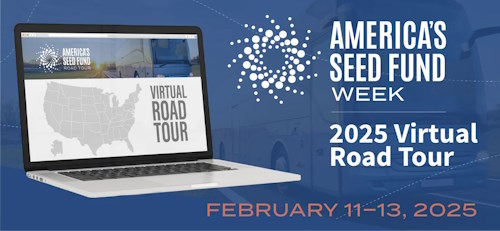
2025 Virtual Road Tour - America’s Seed Fund Week
February 11-13, 2025
The U.S. Small Business Administration is thrilled to announce that America's Seed Fund Week 2025 will take place February 11-13, 2025 and serves as the official kick off for the 2025 SBIR/STTR Road Tour Program. This free online event connects entrepreneurs across the nation working on advanced technologies and the organizations that support them to America's Seed Fund, the country’s largest source of early-stage funding through the Small Business Innovation Research (SBIR) and Small Business Technology Transfer (STTR) programs.

Special EPSCoR Research Fellows Webinar for Vermont Researchers
Saturday, January 25th, 2025 10:00 AM to 11:00 AM
Please save the date for a special webinar on the EPSCoR Research Infrastructure Improvement : EPSCoR Research Fellows funding opportunity. NSF Program Officers, Drs. Lisa Cliggett and Hongmei Luo, will offer a special session for Vermont researchers on January 25, 2025 from 10:00 – 11:00 AM as part of the upcoming VBRN Career Day Workshop.

Alan Alda Communicating Science Workshop
Thursday, January 9th, 2025 9:00 AM to 12:00 PM
Vermont EPSCoR is happy to offer an online Alan Alda Communicating Science Workshop. There are 20 total available slots available for this three-hour workshop. This is open to all SOCKS participants, and there is no cost to attendees.
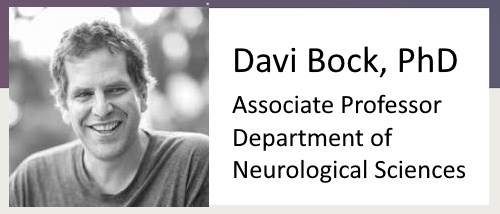
VCSI Speaker - Dr. Davi Bock - Larner College of Medicine University of Vermont
Thursday, December 5th, 2024 1:00 PM - Innovation E100 and on Teams
Wherefore Connectomics
Recently, the multi-lab FlyWire consortium announced the completion of the synaptic wiring diagram of all neurons in the brain of an adult fruit fly — its connectome. This was greeted with much fanfare and hoopla. Why? Can/will this class of data be used to achieve genuine insight into how large ensembles of neurons process, store, and use information to guide behavior? Somewhat to my own surprise, there seems to be a path emerging toward an answer of “yes.” I will introduce electron microscopy (EM)-based connectomics, how my lab imaged the whole fly brain at synaptic resolution, and how this dataset was transformed into a connectome by a mix of the cathedral and the bazaar. I will then describe current multidisciplinary and multimodal approaches that leverage the connectome to generate insight, including a recent example in which deep learning was used to fit parameters for a realistic and predictive electrophysiological simulation of a large network at the visual periphery.
Wherefore Connectomics
Recently, the multi-lab FlyWire consortium announced the completion of the synaptic wiring diagram of all neurons in the brain of an adult fruit fly — its connectome. This was greeted with much fanfare and hoopla. Why? Can/will this class of data be used to achieve genuine insight into how large ensembles of neurons process, store, and use information to guide behavior? Somewhat to my own surprise, there seems to be a path emerging toward an answer of “yes.” I will introduce electron microscopy (EM)-based connectomics, how my lab imaged the whole fly brain at synaptic resolution, and how this dataset was transformed into a connectome by a mix of the cathedral and the bazaar. I will then describe current multidisciplinary and multimodal approaches that leverage the connectome to generate insight, including a recent example in which deep learning was used to fit parameters for a realistic and predictive electrophysiological simulation of a large network at the visual periphery.
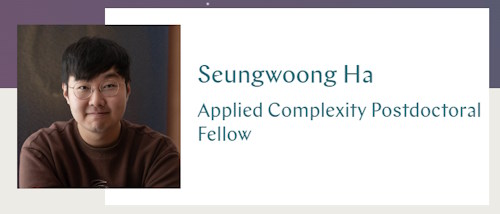
SOCKS Speaker - Dr. Seungwoong Ha - Santa Fe Institute
Thursday, December 5th, 2024 3:00 PM Innovation E425 and on Teams
Dynamics of Collective Minds: A Computational Model of News-Comment Dynamics
In an online community, many of the community users collectively consist of a unique set of interests and beliefs, which can be expressed as a 'collective mind' of the community. We are interested in what the collective mind of community users is aiming for, especially in terms of diverse topics, and what would be the dynamics of the frequency of the comments on certain topics (along with the similarity between those topics). After gathering data from nearly 10 years of news and comment data from 5 different online news communities, we aim to build a simple yet comprehensive computational model for the online news community where news articles and comments are posted daily. In this model, the outside world that generates 'news', the community-specific filter then determines which news will get posted or not on their community, the 'collective mind' of the community reacts to the filtered news and generates comments, and finally, these comments alter the collective mind itself, repetitively. With this model, our goal is to explore the variety of interventions that may affect the community mind, such as comment filtering, strong editorial policies, and trolls/bots regulations.
Dynamics of Collective Minds: A Computational Model of News-Comment Dynamics
In an online community, many of the community users collectively consist of a unique set of interests and beliefs, which can be expressed as a 'collective mind' of the community. We are interested in what the collective mind of community users is aiming for, especially in terms of diverse topics, and what would be the dynamics of the frequency of the comments on certain topics (along with the similarity between those topics). After gathering data from nearly 10 years of news and comment data from 5 different online news communities, we aim to build a simple yet comprehensive computational model for the online news community where news articles and comments are posted daily. In this model, the outside world that generates 'news', the community-specific filter then determines which news will get posted or not on their community, the 'collective mind' of the community reacts to the filtered news and generates comments, and finally, these comments alter the collective mind itself, repetitively. With this model, our goal is to explore the variety of interventions that may affect the community mind, such as comment filtering, strong editorial policies, and trolls/bots regulations.
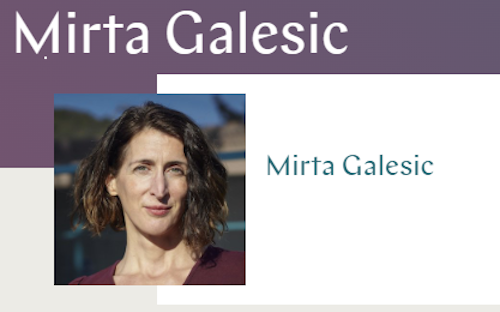
SOCKS Speaker Series - Dr. Mirta Galesic - Santa Fe Institute
Friday, December 6th, 2024 12:00 PM to 1:00 PM Jost Foundation Room, UVM Davis Center and on Teams
Networks of Beliefs in Individual and Collective Minds
Beliefs about issues from vaccination to climate change do not exist in isolation – they are connected to beliefs about related issues and to perceived beliefs others have about those issues. Studying the networks of beliefs within and between individual minds can help us understand when and why people change their beliefs and how phenomena such as polarization occurs even in stable social networks. Dr. Galesic will present a generalized model of belief networks and show how it encompasses several existing models of belief dynamics. Furthermore, she will show how network analysis can reveal patterns of change in collective minds expressed through reader comments on news sites across the U.S. political spectrum.
Networks of Beliefs in Individual and Collective Minds
Beliefs about issues from vaccination to climate change do not exist in isolation – they are connected to beliefs about related issues and to perceived beliefs others have about those issues. Studying the networks of beliefs within and between individual minds can help us understand when and why people change their beliefs and how phenomena such as polarization occurs even in stable social networks. Dr. Galesic will present a generalized model of belief networks and show how it encompasses several existing models of belief dynamics. Furthermore, she will show how network analysis can reveal patterns of change in collective minds expressed through reader comments on news sites across the U.S. political spectrum.
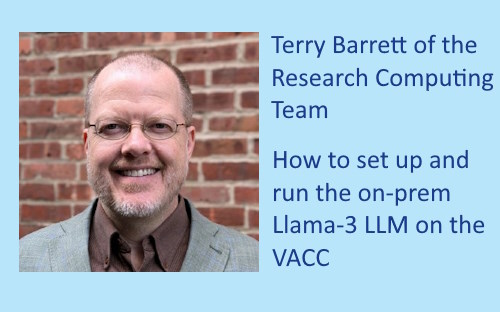
SOCKS Workshop with Terry Barrett - Llama-3 LLM on the VACC
Wednesday, October 23rd, 2024 3:300 PM to 5:00 PM
SOCKS conference room at 440 College Street
and on Teams
New to large language models on the VACC? Join Terry Barrett of the Research Computing Team for a workshop on how to set up and run the on-prem Llama-3 LLM on the VACC. Terry will demonstrate how to fine-tune models to better perform for a particular area of interest, while pointing out challenges and pitfalls to consider.
To attend, please provide your interest and NetID to Terry tcbarret@uvm.edu. There will be shared instructions and code on the meeting chat before the workshop so you can try it out and bring your questions.
Workshop Slides (PDF) Workshop Code Workshop Video
SOCKS conference room at 440 College Street
and on Teams
New to large language models on the VACC? Join Terry Barrett of the Research Computing Team for a workshop on how to set up and run the on-prem Llama-3 LLM on the VACC. Terry will demonstrate how to fine-tune models to better perform for a particular area of interest, while pointing out challenges and pitfalls to consider.
To attend, please provide your interest and NetID to Terry tcbarret@uvm.edu. There will be shared instructions and code on the meeting chat before the workshop so you can try it out and bring your questions.
Workshop Slides (PDF) Workshop Code Workshop Video
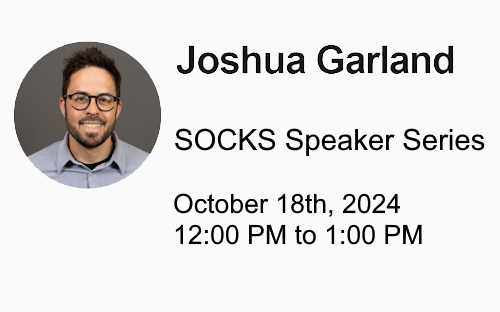
SOCKS Speaker Series - Dr. Joshua Garland
Friday, October 18th, 2024 12:00 PM to 1:00 PM
UVM Alumni House Silver Pavilion
61 Summit Street
Burlington, VT 05405
Information warfare manifests in diverse forms, from targeted disinformation campaigns to the strategic manipulation of local narratives by both foreign and domestic actors. In contrast to traditional warfare, information warfare intricately weaves technology with societal and psychological tactics to effectively pollute the information environment in order to manipulate the target audience. Addressing this complex sociotechnical challenge requires a comprehensive, interdisciplinary approach. In this talk, I will present a curated selection of our ongoing research projects in this field, with the aim of sparking meaningful discussion and fostering collaboration.
For more information, email epscor@uvm.edu
61 Summit Street
Burlington, VT 05405
Information warfare manifests in diverse forms, from targeted disinformation campaigns to the strategic manipulation of local narratives by both foreign and domestic actors. In contrast to traditional warfare, information warfare intricately weaves technology with societal and psychological tactics to effectively pollute the information environment in order to manipulate the target audience. Addressing this complex sociotechnical challenge requires a comprehensive, interdisciplinary approach. In this talk, I will present a curated selection of our ongoing research projects in this field, with the aim of sparking meaningful discussion and fostering collaboration.
For more information, email epscor@uvm.edu
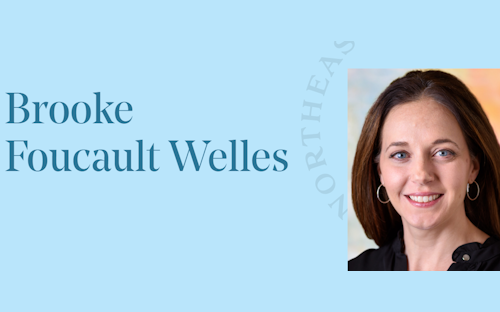
SOCKS Speaker Series - Dr. Brooke Welles
Friday, September 20th, 2024 12:00 PM to 1:00 PM
UVM Alumni House Silver Pavilion
61 Summit Street
Burlington, VT 05405
The decade spanning 2012-2022 social media platforms, especially Twitter, created opportunities for historically excluded people and groups to platform their ideas and create meaningful social change. Research suggests that hashtags such as #BlackLivesMatter and #MeToo profoundly shifted not only how we think about racial and gender justice in the United States, but also helped to usher in lasting policy and structural reform. In this talk, I will explore various mechanisms that allowed Twitter activism to be so successful and reflect on the continued capacity of social media for social change in a post-Twitter world.
Brooke Foucault Welles is a Professor in the Department of Communication Studies and a core faculty member of the Network Science Institute at Northeastern University. Combining the methods of computational social science and network science with the theories of communication studies, Dr. Foucault Welles studies how online communication networks enable and constrain behavior, with particular emphasis on how these networks enable the pursuit of individual, team, and collective goals. She has contributed several critical pieces about computational methods and is the co-editor of a book on computational communication research titled The Handbook of Networked Communication.
For more information, email epscor@uvm.edu
UVM Alumni House Silver Pavilion
61 Summit Street
Burlington, VT 05405
The decade spanning 2012-2022 social media platforms, especially Twitter, created opportunities for historically excluded people and groups to platform their ideas and create meaningful social change. Research suggests that hashtags such as #BlackLivesMatter and #MeToo profoundly shifted not only how we think about racial and gender justice in the United States, but also helped to usher in lasting policy and structural reform. In this talk, I will explore various mechanisms that allowed Twitter activism to be so successful and reflect on the continued capacity of social media for social change in a post-Twitter world.
Brooke Foucault Welles is a Professor in the Department of Communication Studies and a core faculty member of the Network Science Institute at Northeastern University. Combining the methods of computational social science and network science with the theories of communication studies, Dr. Foucault Welles studies how online communication networks enable and constrain behavior, with particular emphasis on how these networks enable the pursuit of individual, team, and collective goals. She has contributed several critical pieces about computational methods and is the co-editor of a book on computational communication research titled The Handbook of Networked Communication.
For more information, email epscor@uvm.edu
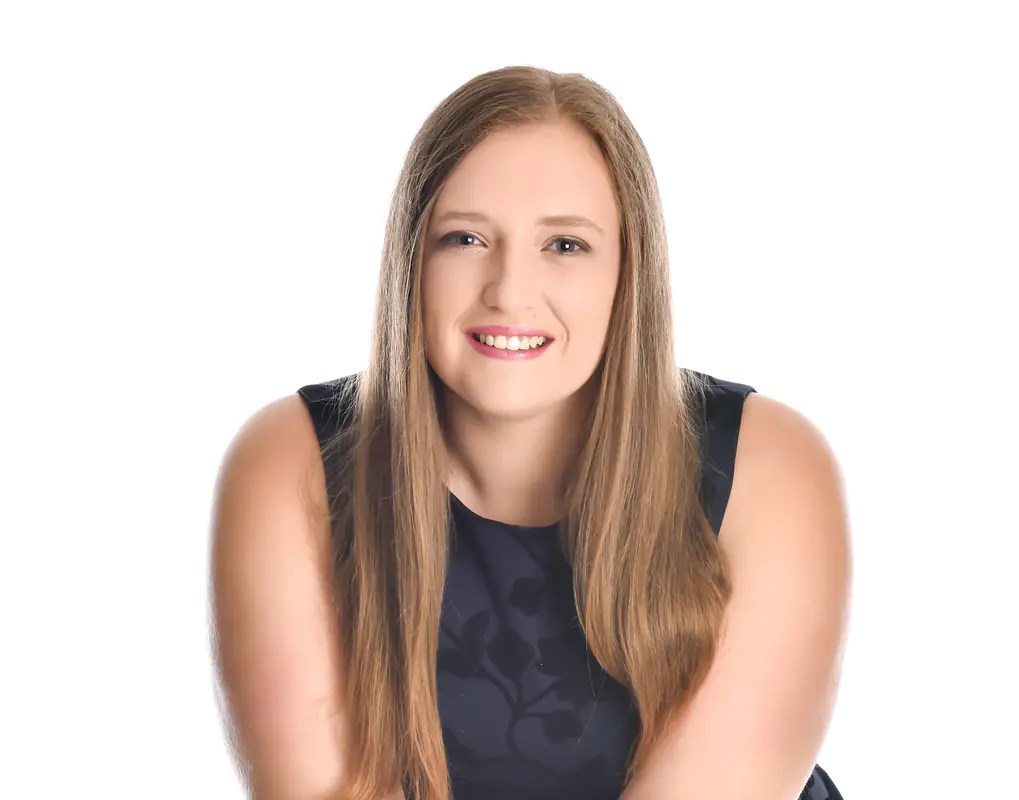
SOCKS Talk: "Using Digital Techniques to Provide Collective Insights into the Experiences of Australian World War I Soldiers" with Ashley Dennis-Henderson
Wednesday, July 31th 2024 12:00 PM
Please join us for a presentation by Ashley Dennis-Henderson at Innovation. 425. Here is the Teams link for those who are unable to attend in person (please try to be in person if you can).
Ashley is visiting from the University of Adelaide where she is a PhD student in Applied Math(s) and Statistics. Her advisor is Lewis Mitchell, who was a postdoc in the Computational Story Lab from 2011 to 2014. Ashley is here for the week and we will be looking to set up individual meetings. Please contact Peter Dodds (peter.dodds@uvm.edu) for arrangements.
Please join us for a presentation by Ashley Dennis-Henderson at Innovation. 425. Here is the Teams link for those who are unable to attend in person (please try to be in person if you can).
Ashley is visiting from the University of Adelaide where she is a PhD student in Applied Math(s) and Statistics. Her advisor is Lewis Mitchell, who was a postdoc in the Computational Story Lab from 2011 to 2014. Ashley is here for the week and we will be looking to set up individual meetings. Please contact Peter Dodds (peter.dodds@uvm.edu) for arrangements.
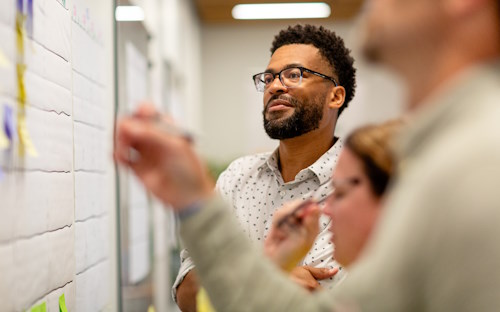
Randall Harp, SOCKS Co-PI, upcoming talk for Philosophy Week! How Should We Punish?
Monday, April 15th, 2024 8:00 PM to 9:00 PM
Venetian Soda Lounge 266 Pine Street, Suite #122 Burlington, VT, 05401 United States
Annual lively series of discussions, talks, tastings, and screenings, aimed at fostering thoughtful reflections on life's most meaningful questions. Continually updating with new events as they take shape, so be sure to revisit this space for the latest updates.
For the full schedule visit:
https://www.publicphilosophyweek.org/
https://www.publicphilosophyweek.org/2024-events/how-should-we-punish
Venetian Soda Lounge 266 Pine Street, Suite #122 Burlington, VT, 05401 United States
Annual lively series of discussions, talks, tastings, and screenings, aimed at fostering thoughtful reflections on life's most meaningful questions. Continually updating with new events as they take shape, so be sure to revisit this space for the latest updates.
For the full schedule visit:
https://www.publicphilosophyweek.org/
https://www.publicphilosophyweek.org/2024-events/how-should-we-punish
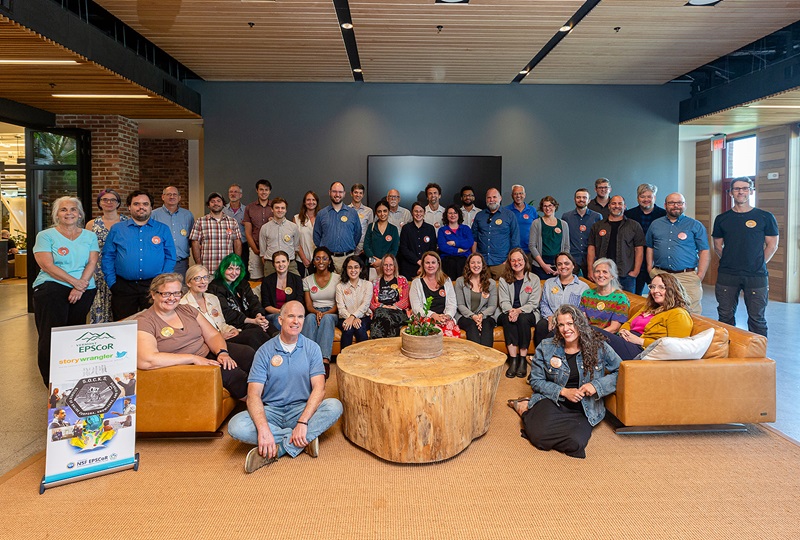
2024 SOCKS All Hands Meeting
Tuesday, April 2nd, 2024 8:30 PM to 3:35 PM
UVM Alumni House, 61 Summit Street, Burlington VT
Please join us for discussions on the research behind the projects and aims for the future.
UVM Alumni House, 61 Summit Street, Burlington VT
Please join us for discussions on the research behind the projects and aims for the future.
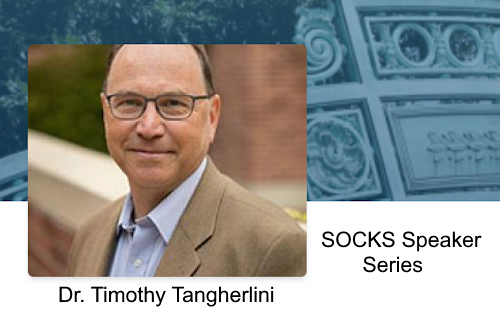
SOCKS Speaker Series - "Parler Games: Conspiracy Theory, Conspiracy, and Insurrection" with Timothy Tangherlini, PhD
Friday, March 29th, 2024 12:00 PM to 1:00 PM
Please join us for a presentation by Timothy Tangherlini, PhD, on Friday, March 29th at 12:00 PM in the UVM Alumni House Silver Pavilion. Dr. Tangherlini will present “Parler Games: Conspiracy Theory, Conspiracy, and Insurrection.”
Timothy Tangherlini is Professor of Folklore at the University of California Berkeley, where he also serves as graduate advisor in the Folklore program and the associate director of the Berkeley Institute for Data Science. He has developed computational approaches to stories and storytelling over the past three decades.
Event Video Event Slides (PDF)
Please join us for a presentation by Timothy Tangherlini, PhD, on Friday, March 29th at 12:00 PM in the UVM Alumni House Silver Pavilion. Dr. Tangherlini will present “Parler Games: Conspiracy Theory, Conspiracy, and Insurrection.”
Timothy Tangherlini is Professor of Folklore at the University of California Berkeley, where he also serves as graduate advisor in the Folklore program and the associate director of the Berkeley Institute for Data Science. He has developed computational approaches to stories and storytelling over the past three decades.
Event Video Event Slides (PDF)
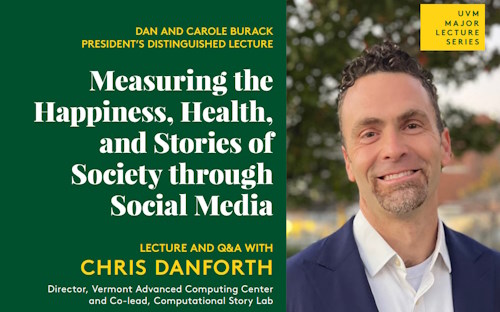
Lecture with Chris Danforth - Measuring the Happiness, Health, and Stories of Society through Social Media
Monday, November 13th, 2023 4:30 PM
WATERMAN MEMORIAL LOUNGE
85 South Prospect St. - Room 338
Professor of Mathematics & Statistics at the University of Vermont, Chris Danforth serves as the Director of the Vermont Advanced Computing Center and co-leads the Computational Story Lab research group at the Vermont Complex Systems Center. He has extensive experience in chaos theory applied to weather forecasting and current research on socio-technical systems and is the co-inventor of hedonometer.org, an instrument that measures daily happiness based on social media use. Danforth has also developed algorithms to identify predictors of depression from Instagram photos.
WATERMAN MEMORIAL LOUNGE
85 South Prospect St. - Room 338
Professor of Mathematics & Statistics at the University of Vermont, Chris Danforth serves as the Director of the Vermont Advanced Computing Center and co-leads the Computational Story Lab research group at the Vermont Complex Systems Center. He has extensive experience in chaos theory applied to weather forecasting and current research on socio-technical systems and is the co-inventor of hedonometer.org, an instrument that measures daily happiness based on social media use. Danforth has also developed algorithms to identify predictors of depression from Instagram photos.
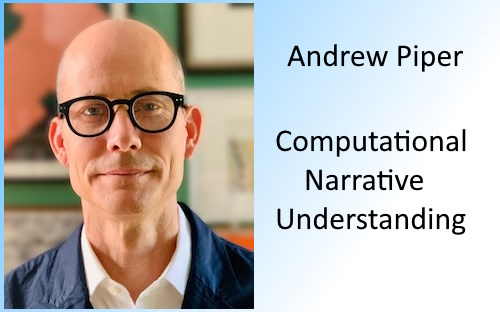
“Computational Narrative Understanding” with Dr. Andrew Piper, PhD
Friday, November 3rd, 2023 12:00 PM
Please join us for a presentation by Andrew Piper, PhD on Friday, November 3rd at 12:00 PM in the Williams Family Room of the UVM Davis Center. Dr. Piper will present “Computational Narrative Understanding.” Lunch will be provided.
Dr. Piper is a Professor of Languages, Literatures, and Cultures at McGill University. He completed his PhD in German Literature in 2005 at the University of Columbia and is also an Associate Member of McGill's Department of Art History and Communication Studies.
Please join us for a presentation by Andrew Piper, PhD on Friday, November 3rd at 12:00 PM in the Williams Family Room of the UVM Davis Center. Dr. Piper will present “Computational Narrative Understanding.” Lunch will be provided.
Dr. Piper is a Professor of Languages, Literatures, and Cultures at McGill University. He completed his PhD in German Literature in 2005 at the University of Columbia and is also an Associate Member of McGill's Department of Art History and Communication Studies.
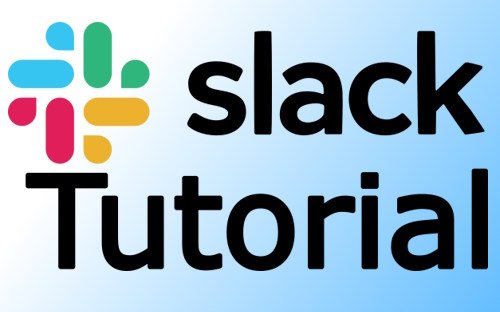
Slack Tutorial with Juniper Lovato
Wednesday, October 18th, 2023 3:00 PM to 4:00 PM
Attend via Zoom.
Tutorial on using the Slack space for SOCKS members presented by Juniper Lovato.
Event Video
Attend via Zoom.
Tutorial on using the Slack space for SOCKS members presented by Juniper Lovato.
Event Video
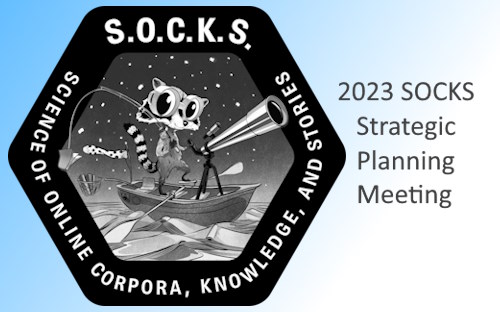
2023 SOCKS Strategic Planning Meeting
Thursday, August 24th, 2023 8:30 AM to 5:00 PM
Reception 6:00 PM to 8:00 PM
Friday, August 25th, 2023 8:30 AM to 5:00 PM
Burlington Hula Lakeside, 50 Lakeside Avenue.
Two day Strategic Planning Meeting for all SOCKS members.
Reception 6:00 PM to 8:00 PM
Friday, August 25th, 2023 8:30 AM to 5:00 PM
Burlington Hula Lakeside, 50 Lakeside Avenue.
Two day Strategic Planning Meeting for all SOCKS members.